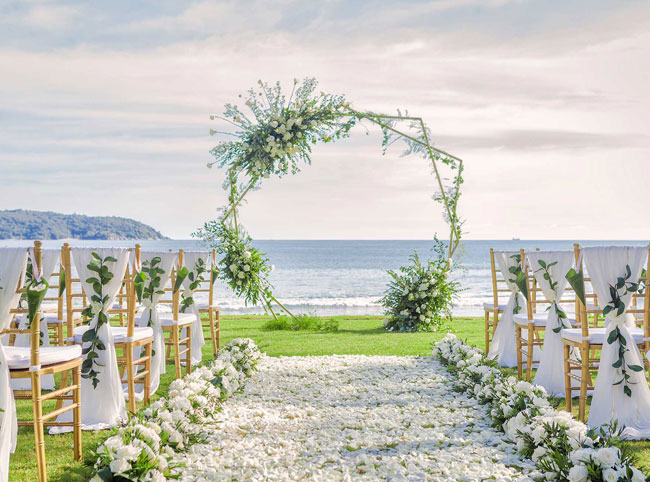Dreaming of an exotic wedding amidst stunning landscapes and rich cultural experiences? Destination weddings in Northern parts of Australia, Asia or Europe have become an alluring option for Australian couples seeking a unique and unforgettable celebration. While it offers an enchanting experience, there are certain pros and cons to consider before taking the plunge.
What is a destination wedding
A destination wedding is a type of wedding ceremony and celebration that takes place in a location away from the couple’s hometown or residence. Instead of getting married in their local area, the couple decides to host their wedding in a different city, country, or even a remote and exotic location. This trend has gained popularity in recent years as couples seek unique and memorable experiences for their special day.
The chosen destination often holds special significance for the couple, such as a favorite vacation spot, a place where they met, or a location that holds cultural or sentimental value. Popular destination wedding locations include tropical beaches, historic cities, picturesque countryside, and renowned tourist destinations worldwide.
Destination weddings can range in size and style, from intimate elopements with just the couple and a few close family members to larger gatherings with dozens of guests. Couples may opt for an all-inclusive resort or hotel package that caters to weddings, simplifying the planning process, or they may choose to work with local wedding planners and vendors to create a unique and personalized event.
While destination weddings offer an opportunity for an extraordinary experience, they also come with logistical challenges, additional expenses for travel and accommodations, and potential complexities in dealing with different legal requirements and cultural practices. Despite these factors, many couples find the allure of a destination wedding irresistible, as it allows them to combine their wedding celebration with a memorable travel experience for themselves and their guests.

Is a destination wedding legal
Yes, a destination wedding can be legal, but it depends on various factors such as the destination country’s laws and requirements, as well as compliance with legal formalities.
To ensure the legality of a destination wedding, it’s crucial to research and understand the legal procedures and requirements of the country where the wedding will take place. Each country has its own set of rules and regulations governing marriages, including residency requirements, documentation, waiting periods, and witnesses.
Here are some important steps to consider to ensure the legality of a destination wedding:
- Research Legal Requirements: Research the marriage laws and regulations of the destination country to understand what documents and procedures are needed. Many countries require specific paperwork, such as birth certificates, passports, divorce decrees (if applicable), and affidavits of single status.
- Contact Local Authorities: Reach out to the local authorities or embassy of the destination country to obtain accurate and up-to-date information on the legal requirements for getting married there.
- Use a Wedding Planner or Coordinator: Consider hiring a local wedding planner or coordinator who is familiar with the legal procedures in the destination country. They can help navigate the paperwork and ensure all requirements are met.
- Plan Ahead: Some countries may have residency requirements, meaning you need to be in the country for a certain number of days before the wedding. Plan accordingly to fulfill these requirements.
- Follow All Procedures: It’s essential to follow all the legal procedures and submit the necessary documentation as required by the destination country. Failure to do so may result in the wedding not being legally recognized.
- Register the Marriage: After the wedding, ensure that the marriage is registered with the appropriate authorities in the destination country. Some countries require immediate registration, while others allow a grace period.
By conducting thorough research and working with the right professionals, a destination wedding can be a legal and memorable experience for the couple and their guests.
When should you have a destination wedding?
The best time to have a destination wedding depends on several factors, including the location you choose and your preferences regarding weather, costs, and availability. Consider the following points when deciding the timing of your destination wedding:
- Weather: Australia’s climate varies greatly from north to south. If you’re planning a beach wedding in the tropical north (e.g., Cairns, Whitsundays), the dry season from April to November is ideal, as it offers pleasant weather with lower chances of rain and humidity. For southern regions (e.g., Sydney, Melbourne), the warmer months from November to April may be more suitable, but keep in mind that these areas can experience occasional heatwaves and rainfall.
- Off-Peak vs. Peak Season: Destination wedding costs can significantly differ depending on the time of year. Off-peak seasons (usually outside major holidays and school vacation periods) may offer more affordable rates for accommodation, venues, and flights. However, peak season might be more appealing if you want to ensure good weather and vibrant local activities.
- Consider Your Guests: If you have specific family and friends you want to attend, consult with them about their availability and preferences. Some may have work commitments or personal events that could affect their attendance.
- Advance Planning: Destination weddings require extensive planning, so allow ample time for organizing all the details. It’s recommended to start planning at least 12 to 18 months in advance to secure preferred venues, vendors, and accommodations.
- Research Local Events: Before finalizing your destination and wedding date, research local events and festivals that might coincide with your planned date. Certain events may attract large crowds and increase accommodation costs.

Destination weddings in Asian Countries
The best time to have a destination wedding in Asia depends on the specific location you choose and your preferences for weather, availability, and cost considerations. As Asia is a vast and diverse continent with various climates and regions, it’s essential to consider the following factors when deciding on the timing of your destination wedding:
- Weather: Asia experiences different weather patterns across its regions. For tropical destinations like Bali, Thailand, and the Maldives, the dry season (typically from November to April) is generally preferred as it offers pleasant weather with minimal rainfall and lower humidity. On the other hand, if you’re considering destinations in temperate regions like Japan or South Korea, spring (March to May) or autumn (September to November) can be ideal with mild temperatures and colorful landscapes.
- Avoiding Monsoons: In some parts of Southeast Asia, monsoon seasons bring heavy rains and storms, which might not be conducive to a destination wedding. Be cautious about the monsoon seasons in your chosen destination and try to avoid planning your wedding during those periods.
- Peak vs. Off-Peak Season: Popular tourist destinations in Asia often have peak and off-peak seasons. Peak seasons can be more crowded and expensive, but they also offer more vibrant local activities and experiences. Off-peak seasons might provide more affordable rates and fewer tourists, but you’ll need to consider the potential impact of weather conditions during these times.
- Cultural Events: Consider local holidays and cultural events when planning your destination wedding. Some cultural events can be an exciting addition to your celebration, while others may lead to increased travel costs or limited availability for accommodations and vendors.
- Guest Availability: Consult with your important guests (family and close friends) about their availability during your preferred dates. Their presence and participation are crucial to making your destination wedding a memorable experience.
- Booking in Advance: Once you’ve decided on a date and destination, book your venues and vendors well in advance. Popular locations can fill up quickly, especially during peak seasons, so early planning is essential.
Ultimately, the best time for a destination wedding in Asia will depend on the specific location you choose and your personal preferences. Carefully research your chosen destination’s climate and peak tourist seasons, and consider the needs and preferences of your guests to ensure a successful and enjoyable celebration.

Destination Weddings in Europe
The best time to have a destination wedding in Europe depends on the specific country or region you choose and the type of wedding experience you desire. Europe offers a diverse range of climates and landscapes, so it’s important to consider the following factors when deciding on the timing of your destination wedding:
- Weather: Europe experiences distinct seasons, and the weather can vary significantly from country to country. Spring (April to June) and early autumn (September to October) are generally favorable times for a destination wedding in many European countries. During these seasons, the weather is often mild, and you can enjoy blooming flowers in spring or beautiful fall foliage in autumn. However, some southern Mediterranean destinations like Italy, Greece, and Spain can be enjoyable for weddings even during late spring or early summer.
- Tourist Season: Popular tourist destinations in Europe can get crowded and expensive during peak tourist seasons, which are typically during the summer months (July and August). While summer weddings can be magical in Europe, you may need to consider the potential influx of tourists and higher prices for accommodations and venues.
- Off-Peak Season: If you prefer a more intimate and budget-friendly wedding, consider having your destination wedding during the off-peak season, such as late autumn, winter, or early spring. While the weather may be cooler, you’ll likely encounter fewer tourists and find more competitive rates for venues and services.
- Destination Specific Events: Be mindful of local holidays, festivals, or events that may coincide with your chosen wedding dates. While some events can add cultural richness to your celebration, others may affect availability and prices.
- Travel Considerations: When planning a destination wedding in Europe, keep in mind the travel logistics for you and your guests. Ensure that your chosen dates align with everyone’s schedules and allow sufficient time for travel arrangements.
- Venue and Vendor Availability: Popular wedding venues and vendors can get booked up quickly, especially during peak seasons. Start your planning early to secure your preferred choices.
Ultimately, the best time for a destination wedding in Europe will depend on your personal preferences, the desired climate, and the specific experiences you wish to have. Do thorough research on your chosen European destination, consider the needs and preferences of your guests, and plan ahead to create a magical and memorable wedding celebration in Europe.
Advantages of a Destination Wedding vs. a Traditional Wedding
Destination weddings and traditional weddings each offer unique advantages, catering to different preferences and priorities. Here are some advantages of a destination wedding compared to a traditional wedding:
Advantages of a Destination Wedding:
- Exotic Experience: Destination weddings allow couples to exchange vows in picturesque and exotic locations, such as tropical beaches, historic castles, or breathtaking mountain vistas, providing a memorable and distinctive backdrop.
- Intimate Gathering: Destination weddings often result in smaller guest lists, as not all guests can travel to the chosen location. This creates a more intimate and close-knit celebration, allowing couples to spend quality time with their closest family and friends.
- Built-in Honeymoon: Since you’re already in a beautiful location, the destination wedding naturally transitions into the honeymoon, saving time and additional travel expenses.
- Stress Reduction: Many resorts and hotels that specialize in destination weddings offer all-inclusive packages, providing dedicated wedding planners and on-site coordinators. This can significantly reduce the stress of wedding planning and ensure a smoother event.
- Cultural Immersion: Couples and guests get the chance to experience and appreciate different cultures, customs, and traditions in the chosen destination, adding depth and meaning to the celebration.
Advantages of a Traditional Wedding:
- Familiarity: Traditional weddings take place in the couple’s hometown or a familiar location, making it easier for family and friends to attend without the need for extensive travel arrangements.
- Larger Guest List: Traditional weddings typically accommodate a larger number of guests, allowing the couple to include a broader circle of family, friends, and acquaintances.
- Flexibility in Venue and Vendors: With a traditional wedding, couples have more options for venues and vendors, as they are not limited to specific locations and can choose from a wide range of local options.
- Cost Savings: Traditional weddings can sometimes be more budget-friendly, as they eliminate the need for long-distance travel and the associated expenses for both the couple and guests.
- Community Involvement: A traditional wedding often involves the local community and neighborhood, fostering a sense of togetherness and shared joy during the celebration.
Ultimately, the decision between a destination wedding and a traditional wedding depends on the couple’s preferences, budget, and the type of experience they want for their special day. Both options can lead to a beautiful and meaningful wedding, and couples should choose the one that resonates most with their vision and values.

Do you save money with a destination wedding?
Whether a destination wedding saves money compared to a traditional wedding depends on various factors, including the location chosen, the number of guests, and the specific arrangements made. In some cases, destination weddings can be more cost-effective, while in others, they may end up being more expensive. Here are some considerations:
- Smaller Guest List: Destination weddings often result in a smaller guest list since not everyone can travel to the chosen location. Having fewer guests can lead to cost savings on catering, venue rental, and other per-head expenses.
- All-Inclusive Packages: Many resorts and hotels in popular destination wedding locations offer all-inclusive wedding packages. These packages can bundle together various services, such as venue rental, catering, decor, and sometimes even accommodation for the couple and their guests. Opting for an all-inclusive package can help control costs and simplify planning.
- Honeymoon Savings: One advantage of a destination wedding is that it can seamlessly transition into the honeymoon. This consolidation of events can save on travel costs and allow couples to take advantage of honeymoon packages offered by the wedding venue or nearby resorts.
- Reduced Decor Expenses: Some destination wedding locations, such as beaches or gardens with natural beauty, may require minimal decor, which can help cut down on decoration expenses.
- Travel Expenses: While the couple and some guests will incur travel expenses to reach the destination, these costs can vary significantly depending on the location and time of travel. Sometimes, airfare deals and travel discounts can help offset these expenses.
However, it’s important to consider potential additional costs associated with destination weddings:
- Travel and Accommodation for Guests: Some guests may require financial assistance to attend a destination wedding, especially if it involves international travel or remote locations.
- Vendor Fees: Hiring local vendors at the destination might come with added costs due to unfamiliarity and transportation fees for equipment and supplies.
- Legal and Administrative Requirements: Destination weddings may involve specific legal and administrative requirements, such as paperwork, translations, and additional fees.
- Planning Trips: Couples may need to make one or more trips to the destination before the wedding to scout venues, meet vendors, and finalize arrangements, adding to the overall cost.
Ultimately, whether you save money with a destination wedding depends on how you plan and manage the various expenses. It’s essential to conduct thorough research, compare costs, negotiate with vendors, and consider the overall experience and value of the destination when making your decision.
How many people should be invited to a destination wedding?
The number of people invited to a destination wedding can vary widely based on the couple’s preferences, budget, and the logistics of the chosen location. Here are some factors to consider when deciding how many guests to invite:
- Intimacy: Destination weddings often have a more intimate atmosphere due to the nature of travel and the limited number of guests who can attend. Many couples choose to invite close family members and a select group of their closest friends to create a more personal and meaningful experience.
- Budget: The cost of a destination wedding can be influenced by the number of guests, as you’ll need to consider expenses such as accommodation, travel, meals, and activities for each attendee. Smaller guest lists may help keep costs more manageable.
- Guest Accessibility: Consider the ease of travel for your potential guests. Some may have constraints due to work, family commitments, or financial limitations, which could affect their ability to attend a destination wedding.
- Venue Capacity: Check the capacity of your chosen venue or resort to ensure it can comfortably accommodate the number of guests you plan to invite.
- Guest Expectations: Communicate with your potential guests early on to gauge their interest and willingness to attend a destination wedding. This will help you estimate the likely number of attendees.
While there is no fixed rule for the ideal number of guests at a destination wedding, many destination weddings have guest lists ranging from 20 to 100 people. Some couples opt for even smaller elopements with just a few witnesses, while others have larger gatherings with close to a hundred guests. Ultimately, it’s essential to strike a balance between creating a memorable and intimate experience for you and your guests while considering practicalities and your budgetary constraints.

How long do guests stay at a destination wedding?
- Weekend Getaway: For many destination weddings, guests often stay for a weekend, typically arriving on a Friday or early Saturday and departing on Sunday or Monday. This allows them to participate in pre-wedding events, attend the wedding ceremony and reception, and enjoy some leisure time before heading back.
- Extended Weekend: Some couples may plan a more extended weekend celebration, with guests arriving on Thursday or even Wednesday and departing on Monday or Tuesday. This gives guests extra time to explore the destination and enjoy additional activities or relaxation.
- Weeklong Celebration: In certain cases, especially for destination weddings in far-flung or exotic locations, the couple and some guests may choose to turn the wedding into a weeklong celebration. This extended stay allows for more bonding time, group excursions, and the chance to enjoy the destination’s attractions.
- Short Elopement: For very intimate destination weddings or elopements, guests may only stay for the wedding day or a single night. This is more common when the guest list is limited to close family members and a few friends.
It’s essential for couples planning a destination wedding to communicate clearly with their guests about the expected duration of the celebration and any activities or events they may wish to participate in. This allows guests to plan their travel and accommodations accordingly. Additionally, the couple may provide recommendations for nearby hotels or resorts where guests can stay, making it easier for everyone to coordinate their arrangements.
Is it rude not to give a gift to a destination wedding?
While it is customary for guests to give gifts to the couple at a wedding, including destination weddings, it is not considered rude if a guest chooses not to give a physical gift, especially considering the additional expenses involved in attending a destination wedding. Destination weddings often require guests to incur travel and accommodation costs, which can be substantial, making it understandable that some guests may prioritize their presence and participation over a physical gift.
In the context of destination weddings, the couple typically understands that guests are making a significant effort and investment to attend, and their presence and support are cherished gifts in themselves. Couples who choose to have a destination wedding often do so knowing that not all guests will be able to provide traditional gifts.
If a guest wants to express their love and well-wishes but is unable to give a physical gift, they can consider other thoughtful gestures, such as a heartfelt card, a personal note, or a sentimental memento that captures the essence of the destination or their relationship with the couple. Ultimately, what matters most to couples is the presence of their loved ones and the shared elebration of their special day, regardless of whether physical gifts are given.
